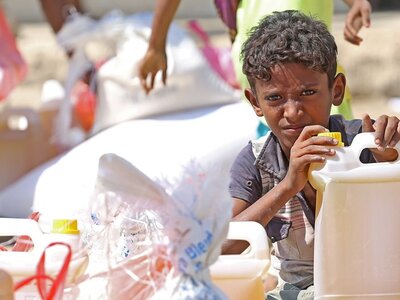Emergency
Yemen
- 19.5 million
- people need humanitarian assistance
- 17.1 million
- people are food insecure
- US$577 million
- funding needed for WFP operations until October 2025
More than a decade of conflict in Yemen has created one of the world's most severe humanitarian crises.
The conflict, coupled with economic downturns and recurring disease, has left over 17 million people food insecure. A total of 4.8 million people are internally displaced, many of whom live in camps. Despite a brief truce in 2022, which alleviated tensions and improved humanitarian access, the situation remains dire and requires urgent action.
The World Food Programme (WFP) supplies much of the logistics capacity for the humanitarian response in Yemen, supporting other UN agencies and NGOs.
WFP’s food assistance and the continued support of donors have been instrumental in keeping famine at bay. However, we urgently need to secure additional funding, with operations requiring US$577 million up to October 2025.
What the World Food Programme is doing to respond to the Yemen emergency
-
Food assistance
-
WFP primarily provides food assistance in Yemen, distributing rations to hundreds of thousands of food-insecure households across the country every 45 days.
-
Cash assistance
-
WFP provides cash assistance in southern Yemen in areas where markets are stable enough to provide for communities' basic food needs. The amount of cash assistance a family receives is based on the number of household members. Cash assistance injects much-needed liquidity into the economy and allows families to buy the items they need the most.
-
Nutrition
-
WFP provides specialized nutritious food to young children and pregnant and breastfeeding women suffering from moderate acute malnutrition. We also strengthen the capacity of Ministry of Public Health and Population staff working at local health centres, as well as community health volunteers. This enables them to identify malnutrition cases and educate community members on better health and nutrition practices.
-
School meals
-
Under the school meals programme, WFP provides primary-school children with fortified biscuits each day they attend school. WFP also runs a Healthy Kitchen project that provides locally sourced and freshly prepared school meals with fruits and vegetables, aiming to give children the nutrients they need and help them form healthy eating habits.
-
Logistics
-
WFP is the logistical backbone of humanitarian operations in Yemen. WFP moves humanitarian workers into and around the country through its United Nations Humanitarian Air Service (UNHAS) and transports needed commodities such as fuel for other humanitarian organizations through its Logistics Cluster. Additionally, WFP, through its Emergency Telecommunications Cluster (ETC), helps keep humanitarian workers connected by providing essential telecommunications services in areas that would otherwise have very poor or no connection.



